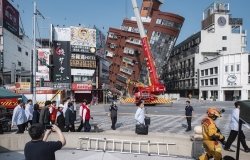Political Islam and Democracy in Indonesia
WILLIAM LIDDLE, Professor of Political Science, Ohio State University; ZULKIEFLIMANSYAH, Head, Department of Economic Policy, Justice Party of Indonesia; IHSAN ALI-FAUZI, Writer and Expert on Indonesian Islam:ERIC BJORNLUND, Moderator and Former Woodrow Wilson Center FellowDownload Asia Program Special Report #110
Overview
Read the conference papers in PDF format
What is the nature of the Islamic movement in Indonesia, and how large is it likely to grow? This question is gaining the attention of many U.S. policy makers as the anti-terror campaign continues in the aftermath of the Bali bombing that killed about 190 people. The Asia Program hosted three speakers to give their views on how Islamic parties are expressing their convictions and winning adherents in Indonesia’s still-young democracy.
William Liddle of Ohio State University started out the discussion with an overview of political Islam in Indonesia since independence in 1945. While this long-term view shows Islamic parties have declined, recent trends are pointing toward a possible reinsurgence. For example, 71% of survey respondents in 2002 agreed “that the state should require all Muslim men and women to abide by the syariat (Islamic law).” According to Liddle, this suggests that “millions of Indonesians may be more susceptible to the appeals of the Islamists than observers have previously thought.” However, Liddle pointed out that these results have been sensationalized to some extent in the United States; in Indonesia, syariat is rather loosely defined and perceived (somewhat like the 10 Commandents). Political Islamists, indeed, have a far more specific (and sometimes draconian) idea of what syariat means¾but they are a small percentage of the whole Indonesian Muslim population.
“Zul” Zulkieflimansyah, a young leader and activist in the Islamic Justice (PK) Party pointed out that his party is small but growing, with college-educated leaders (Zul himself has a Ph.D. in economics from a British university) and high school–educated voters. In Indonesia’s corrupt political system, the Justice Party is building upon its reputation for solidarity, integrity and clean government, as Zul explained. However, he did not get into the specifics of how his Islamic party differs from a secular one, in terms of particular policy goals. Rather than try to impose Islamic law on Indonesia, Zul maintained, the Justice party aims to spread its ideals gradually through Islamic values of tolerance and peace---which are also universal. He mentioned the extreme difficulty of explaining to mosque leaders the importance of technology and economic development.
Mohamad Ihsan Alief, a member of the “liberal,” or moderate, Islamic network, emphasized that the majority of Indonesian Muslims are peaceful¾the extremist “threat” often appears greater than it actually is because hardliners tend to get media coverage. According to him, the danger to Indonesian democracy is not religious fundamentalism, but disillusion with dishonest, self-interested leaders. (In this light, he is not against PK’s activities, though he comes from a very different political camp.) He criticized the United States for portraying Indonesia as a “new-founded terrorist camp.” After all, much of the rhetoric of Islamic parties are expressions of “long muted and repressed voices” who are exercising their democratic rights. He also criticized the United States for forcing all Indonesian males in the United States to be interviewed by immigration officers, suggesting that such discriminatory policies only fan anti-Americanism and make the job of democracy-builders all the harder.
Drafted by Amy McCreedy, Asia Program Associate, 202/691-4013
Robert M. Hathaway, Asia Program Director
Hosted By

Indo-Pacific Program
The Indo-Pacific Program promotes policy debate and intellectual discussions on US interests in the Asia-Pacific as well as political, economic, security, and social issues relating to the world’s most populous and economically dynamic region. Read more
Thank you for your interest in this event. Please send any feedback or questions to our Events staff.










